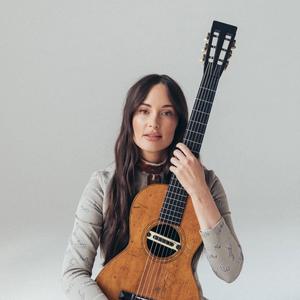




Link copied

Everything you need to know about Noah's heartfelt musing on reconciliation, taken from his 2022 album, ‘Stick Season.
Noah Kahan - ‘Orange Juice’
Label: Mercury Records & Republic Records
Release Date: October 14, 2022
Album: Stick Season
Producers: Gabe Simon & Noah Kahan
Songwriter: Noah Kahan
The Background:
Released as part of Noah Kahan's 2022 magnum opus, Stick Season, ‘Orange Juice’ epitomises the folk-leaning crooner's ability to wrap visceral, emotive sentiments in irresistible, honeyed melodies. It has all the hallmarks of a ballad, but in classic Noah Kahan fashion, he switches up the tempo partway through to elevate ‘Orange Juice’ into an uptempo earworm, without ever sacrificing its intricacy and intimacy.
‘Orange Juice’ was penned about a couple of friends that come together again years after a traumatic drunk driving incident, which left some passengers dead and drove the two apart.
Despite not being one of the many Stick Season offerings to be reimagined into a star-studded duet, and therefore flying under the radar for Noah Kahan's more casual listeners, ‘Orange Juice’ has become a heartfelt fan-favourite for his aficionados, with the track emerging as one of the most moving parts of his 2024 setlist.
During Noah Kahan's emotional Fenway Park double-header, the ‘You're Gonna Go Far’ singer-songwriter broke down in tears while performing ‘Orange Juice’, with the evocative moment serving as a testament to how much those two Boston shows meant to him.
The Sound:
Noah Kahan showcases his dexterous vocals throughout ‘Orange Juice’, with the Vermont native opening with a delicate delivery accompanied by a light, hesitant strum of an acoustic guitar. This seemingly symbolises the slight trepidation of both friends as they see each other for the first time since the tragic accident.
Then, the track quickly takes on a driving, energised ambience, fuelled by an energising, synth-laden instrumental and the introduction of an almost jarringly uptempo drum pattern, which highlights the contrast with the tenderness of the intro and outro.
This feels as though it represents the swelling of emotions as the painful memories resurface and the two friends exchange harsh words about their subsequent distance.
When Noah croons “It filled you with anger”, the instrumentation is stripped entirely away, accentuating the anguish of the line and creating one of the most stirring portions of the song.
The Meaning:
“Honey, come over
The party's gone slower
And no one will tempt you
We know you got sober
There's orange juice in the kitchen
Bought for the children
It's yours if you want it
We're just glad you could visit”
‘Orange Juice’ opens with the protagonist tentatively welcoming an old friend into his home, with the two not seeing one another since a traumatic drunk driving accident back in 2002. The car crash led to some passengers losing their lives, with the friend in question struggling to come to terms with this and promptly moving away, while the protagonist stayed in the same town where the incident took place.
We learn in the first verse that the returning friend decided to get sober after the accident, with Noah reassuring them that nobody will tempt them with alcohol while he's over. The reference to the party slowing and there being children around accentuates the feeling that a lot of time has passed since they last saw each other.
Noah Kahan's reference to the orange juice being bought for the children is not intended to belittle the friend, rather, it's a classic example of Noah implementing simple yet relatable imagery that powerfully builds the scene in the listener's mind. We've all been to friends’ houses where there's a seemingly perennial bottle of orange juice kept in the fridge, bought for the guests’ children.
“Feels like I've been ready for you
To come home for so long
That I didn't think to ask you
Where you'd gone, why'd you go?
And you said, "Mmm, mm-hmm"
And you said
You said, “My heart has changed and my soul has changed
And my heart, and my heart
That my face has changed, and I haven't drank in six months
On the dot””
The narrator confesses that he's been focussing on the hope of seeing his friend again for so long, that he didn't even think to ask or wonder where they'd actually gone. He admits some of the blame for the deterioration in their friendship, here, by suggesting that he should've concerned himself more with what had happened to them, rather than fixating on his own desire for them to return to town.
When the other friend tries to respond to Noah Kahan's questions, he stutters, signifying how this is still a difficult topic for him to discuss. Accompanied by the intensification of the instrumental, the emotions are heightened as the friend explains to Noah that he's a different person now, with clearer skin and a purer heart, largely thanks to his sobriety and - as we find out later - his decision to embrace religion. Given the crash happened in 2002, it seems the friend struggled with alcohol for a number of years following this, as he says he's six months sober.
“See the graves as you pass through
From our crash back in '02
Not one nick on your finger
You just asked me to hold you”
Here, we get more details about the incident that drove a wedge between them, with Noah painting the picture of the friend travelling back through the town he left and seeing the graves of the passengers who died in the drunk driving accident.
The protagonist shares that his friend didn't experience any physical damage (“Not one nick on your finger”), but that he did suffer some deep-seated emotional trauma. We get a sense of how close the two once were, with Noah touchingly recalling how the friend asked him to hold him and comfort him after the accident.
“But it made you a stranger
And filled you with anger
Now I'm third in the lineup
To your Lord and your Savior”
Sadly, despite trying to help each other, it seems the friend couldn't handle the feelings of guilt following the crash, with Noah Kahan describing how his PTSD turned him into an angry “stranger”. Now, though, the friend seems to be finding peace, with Noah underlining that he's become very religious, portraying himself as “third in the line-up” behind God and Jesus. This is a nod towards their frayed relationship, as well as a way of spotlighting his friend's newfound spirituality.
“You said, “My heart has changed and my soul has changed
And my heart, and my heart”
That, “My life has changed, that this town had changed
And you had not”
That, “The world has changed, don't you find it strange
That you just went ahead and carried on?”
And you know I'd say, “The last time I drank
I was face down, passed out, there on your lawn””
The friend's reflections on how much has changed since they last spent time together are extended here, as he explains that it's not just his face, heart or soul that's altered, it's also the external world. Everything feels different, he frustratedly shares, before accusing our protagonist of carrying on like things were just the same.
The narrator responds by emphasising how things of course were challenging for him too, disclosing that he has also become sober, with the last time he drank being when they were together and he ended up “face down, passed out” on the friend's lawn.
“Are we all just crows to you now?
Are we all just pulling you down?
You didn't put those bones in the ground
You didn't put those bones in the ground”
The tone becomes increasingly angsty and tense as ‘Orange Juice’ reaches its crescendo, with Noah Kahan losing patience as he attempts to make his friend see that he isn't to blame for what happened. He asks him, “Are we all just crows to you now? Are we all just pulling you down?”, with crows being a common symbol of death, as Noah implies the friend can't see the family and friends he left in the town without thinking of the deaths he still feels responsible for. The narrator tries to underline to his friend that he shouldn't keep blaming himself for the accident, repeating, “You didn't put those bones in the ground”.
Following this climax, Noah Kahan concludes by returning to the warm, gentle tone of the intro, as he reiterates his offer of orange juice alongside a stripped-back acoustic guitar, ending the track on a note of hope that the friends will be able to reconciliate.
What has Noah Kahan said about ‘Orange Juice’?
During a video series uploaded about the album's release, Noah Kahan delved into the story and creative process behind ‘Orange Juice’, “I wrote ‘Orange Juice’ about two friends reconciling after years of being apart, a tragic accident that they went through kind of separated them and one person found religion and the other person stayed in the town where the accident happened, and kind of just moved forward. It's really a song about how trauma can bind you and how it can also separate you, and I always think that going through something traumatic should at least bring you closer to the person that experienced it with you, and I think the hardest thing about that is sometimes it makes you go farther away. I wanted to write about two people coming back together after that time”.
Noah shared how he infused his journey into ‘Orange Juice’, “I drew on a lot of the inspiration [from] my own life, my own struggle with addiction and alcohol, and friendships that I've lost and haven't been able to maintain, and I wanted to create a story about two people that represented a lot of the challenges that I've gone through and that people in my life have gone through, that's what ‘Orange Juice’ is about”.
For the full lyrics to Noah Kahan's ‘Orange Juice', see below:
“Honey, come over
The party's gone slower
And no one will tempt you
We know you got sober
-
There's orange juice in the kitchen
Bought for the children
It's yours if you want it
We're just glad you could visit
-
Feels like I've been ready for you
To come home for so long
That I didn't think to ask you
Where you'd gone, why'd you go?
And you said, "Mmm, mm-hmm"
And you said
-
You said, “My heart has changed and my soul has changed
And my heart, and my heart
That my face has changed, and I haven't drank in six months
On the dot”
-
See the graves as you pass through
From our crash back in '02
Not one nick on your finger
You just asked me to hold you
-
But it made you a stranger
And filled you with anger
Now I'm third in the lineup
To your Lord and your Savior
-
Feels like I've been ready
For you to come home for so long
That I didn't think to ask you
Where you'd gone, so why'd you go?
And you said, "Mmm, hmm-mmm, hmm-mmm, mmm"
And you said, "Mmm-hmm"
-
You said, “My heart has changed and my soul has changed
And my heart, and my heart”
That, “My life has changed, that this town had changed
And you had not”
-
That, “The world has changed, don't you find it strange
That you just went ahead and carried on?”
And you know I'd say, “The last time I drank
I was face down, passed out, there on your lawn”
-
Are we all just crows to you now?
Are we all just pulling you down?
You didn't put those bones in the ground
You didn't put those bones in the ground
-
Honey, come over
The party's gone slower
And no one will tempt you
We know you got sober
-
There's orange juice in the kitchen
Bought for the children
It's yours if you want it
We're just glad you could visit”
For more on Noah Kahan, see below:
READ MORE:
- OPINION•“Every Moment in My Life Has Led Me Here”: Everything That Happened at Noah Kahan's Boston Fenway Park Shows
- ‘Up All Night’ by James Bay, Noah Kahan & The Lumineers - Lyrics & Meaning
- ‘Cowboys Cry Too’ by Kelsea Ballerini & Noah Kahan - Lyrics & Meaning
- Noah Kahan's New Album 2024: Everything We Know So Far
- Noah Kahan & Jelly Roll Join Forces for 'Stick Season' in Nashville
- Noah Kahan Surprises Nashville Audience with Kelsea Ballerini-Assisted Version of 'Stick Season'
- The Best Noah Kahan Songs
- ‘Forever’ by Noah Kahan - Lyrics & Meaning
- 'Spoiled' by Noah Kahan - Lyrics & Meaning
- 'Stick Season' by Noah Kahan - Lyrics & Meaning
- ‘Northern Attitude’ by Noah Kahan & Hozier - Lyrics & Meaning
- Noah Kahan - We'll All Be Here Forever Tour: Dates & Tickets
- ‘She Calls Me Back’ by Noah Kahan & Kacey Musgraves - Lyrics & Meaning
- ‘Sarah's Place’ by Zach Bryan & Noah Kahan - Lyrics & Meaning
- Noah Kahan Concert Tour Setlist
- Noah Kahan Duets - Ranked
- ‘Dial Drunk’ by Noah Kahan & Post Malone - Lyrics & Meaning





